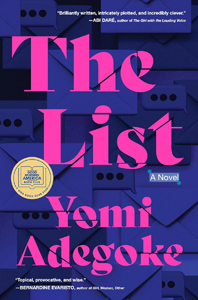First-time novelist Yomi Adegoke dramatizes the #MeToo era in surprisingly thrilling fashion in “The List” (2023). While the idea of private “he said/she said” dramas becoming an international hashtag craze is nutty when one considers everything else going on in the world, Adegoke weaves such a mysterious and emotional yarn about extremely flawed people that I had to know what happens next.
Although the book is overwritten, I got caught up in the gossip of #TheList just like the off-page internet users who stir the pot, but hopefully for less salacious reasons. I wanted to know why Michael, an internet-famous podcaster, is on the list of accused sexual harassers, even though he seems innocent. In that sense, I was right there with his fiancée, Ola, with whom Michael trades POV chapters.
I found Ola’s anxiety over the fact that she loves Michael but doesn’t trust him to be unrelatable. OK, so love is blind. But how in the world can she marry someone she doesn’t trust? However, this ends up being explicable, if not always an enjoyable wait. As an outsider, I can see the obvious flaw in their relationship; for someone blinded by love, it will of course take longer.

“The List” (2023)
Author: Yomi Adegoke
Genres: Relationship drama, mystery thriller
Setting: 2019, London
Note to readers: The Book Club Book Report series features books I’m reading for my book club, Brilliant Bookworms.
Some love is just a lie of the heart
And even though Ola’s and Michael’s journey is fatalistic, it’s still a page-turner, and a microcosm for the horrific side of theoretically well-meaning cancel culture (which, as this UK-set story makes clear, is not limited to the USA). With “The List,” Adegoke performs a thorough autopsy of the impact of sexual abuse allegations, ending up with a robust companion piece to Michael Crichton’s 1994 classic “Disclosure.”
In that novel, sometimes misunderstood as a comment that all men are wrongly accused, Crichton flipped the traditional gender roles to show harassment is foremost about power, not about gender or even sexual goals. A boss (a woman) sexually harasses an underling (a man). She gets away with it, and makes his life hell, because her status allows for it.
In “The List,” Adogoke – like Crichton – goes deeper than the things intelligent people easily understand: 1, that most people are honest when they #MeToo someone, and 2, it’s not right to ruin someone’s life based on hearsay. But the author goes to a next level that Crichton couldn’t (to the same degree) when the internet was primitive.
Michael is on #TheList because someone has the power to accuse him anonymously in the internet age. Should accusations be taken seriously if they are unsigned? If someone signs their name to an accusation, and then earns mostly grief, they can most likely be trusted. An anonymous person can be scared to put herself/himself out there, but unfortunately an anonymous person can likewise desire to light a match and watch the world burn. Anonymous “people” can even be AIs now, and if Crichton were alive, he’d certainly turn that into a techno-thriller. Maybe Adegoke will.

I’m of two minds about “The List’s” deus ex machina that jolts the characters – and the off-page shit-stirrers – back to a sense of perspective. On one hand, it’s convenient. On the other hand, it’s the lesson of the novel: Put facts before emotions, even on emotional issues.
You’re gonna face a moment of truth
All of this would be bland if not for Adegoke’s character writing. No one is a hero, no one is even particularly likeable, but Ola and Michael are keenly drawn. I didn’t grasp half of the slang or cultural references, but that didn’t slow me down. They are of African heritage (with their wedding being in the Western style but with traditional African dress), but very much Londoners.
While I get no sense that either is good at their media job, making them hard to root for on that front, the concept of cultural cancelation becomes quite personal. They know their job security has nothing to do with their work.
If their employer believes the internet mob will hurt their bottom line if they retain the controversial employee, that employee is dunzo. Innocence and basic human compassion are luxuries businesses can’t afford. (On the other hand, not every case is cut and dried, as Disney’s firing – and later rehiring — of James Gunn showed. The public knew Gunn misbehaved with his tweets, but they forgave him, and thus Disney became the bad guy.) But here’s another angle: Michael knows he’s been hired because he is black, as his media company had been criticized for being too white.
Adegoke weaves a lot of perspectives: the importance of “innocent until proven guilty,” the importance of sexual assault victims being heard, and the fact that the anonymity and addictive nature of the internet blows everything out of proportion.
Rather than this being a flaw wherein we say “C’mon, Yomi, pick a perspective,” it’s ultimately the point of “The List,” as crystalized in an epilog that saves the novel after that so-so resolution to the big drama. A surprising character gets the final word, thus bringing up another chilling 2020s angle. Logically, truth is objective. But in day-to-day life, it’s whatever an individual thinks it is.

